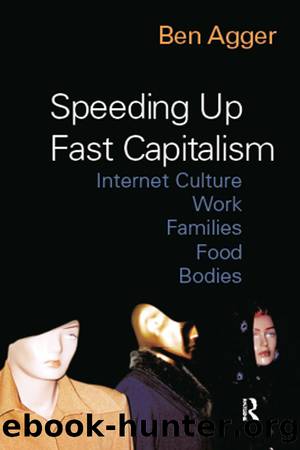Speeding Up Fast Capitalism by Agger Ben;

Author:Agger, Ben;
Language: eng
Format: epub
ISBN: 4218426
Publisher: Taylor and Francis
THE GENDERED CHILD
By the time you are reading this, my daughter will have completed her first year of junior high school. Throughout her sixth-grade year, she has regaled my wife and me with stories of preadolescent dating by some of her classmates, mainly the “cool” kids, who are physically developed, perhaps because their birthdays fall earlier in the year. There are other aspects of coolness, including clothing, comportment, and charisma. Frequently, it is enough for kids to anoint themselves cool for the label to take effect as social differentiation occurs—cool kids, geeks, kids somewhere in the middle.
Social differentiation in the preteen and early teen years is primarily about, and for, girls (Dellasega 2001). Eleven- and twelve-year-old girls are more socially developed than their male counterparts, who seem like clods and dunces by comparison. But accompanying girls’ social intelligence are interpersonal intrigue and intimidation that lead to bullying and marginalization. For the most part, my daughter’s male classmates just play sports and try to ignore the fact that they are on the verge of their teenage years. They must be dragged along to cotillion class and even on “dates” with classmates arranged by their mothers (Hersch 1998).
I vaguely remember liking girls in elementary school. But dating was delayed until high school, and even then it was casual by today’s standards. The older, physically developed, middle- and upper-middle-class kids in my daughter’s grade not only “date” (I must put the word in quotation marks because it isn’t a real date if mommy takes you and attends); they also “go steady.” The term today is going out, as in “Johnny is going out with Suzie.” Going out is, again, a falsehood. At most, these dyads attend the occasional movie and may chat in school. But these pairings and this incipient sexual behavior are mimicry, expressions of what the culture tells these kids that adults do. These eleven- and twelve-year-olds watch Friends and Baywatch reruns; they enter adult chat rooms; they find sex pages on the Web. They have become worldly in ways that include sexuality, although it is a premature sexuality jarringly inconsistent with the media images of adult sexuality to which they are exposed.
This raises important questions about the connection between capitalism and sexuality. The same capitalism that thwarts genuine creativity and connection provokes people to sexualize themselves as an alternative. People are creatures of an intense desire (Eros, in Freud’s terms) that seeks gratification. This gratification can be enduring, when, for example, a painter paints a masterpiece. Or it can be ephemeral and superficial, for example when a person wins a small amount of money in a lottery or when a person adorns himself or herself for the opposite (or same) sex and is judged “hot.” Anonymous sexual release is also an example of ephemeral gratification, although I hasten to add that in a nonalienating society people wouldn’t shun sex; indeed, as Marcuse argues, all of their human relationships would be “erotized,” that is, subject to what he and Freud call the pleasure principle.
Download
This site does not store any files on its server. We only index and link to content provided by other sites. Please contact the content providers to delete copyright contents if any and email us, we'll remove relevant links or contents immediately.
| African-American Studies | Asian American Studies |
| Disabled | Ethnic Studies |
| Hispanic American Studies | LGBT |
| Minority Studies | Native American Studies |
Cecilia; Or, Memoirs of an Heiress — Volume 1 by Fanny Burney(31351)
Cecilia; Or, Memoirs of an Heiress — Volume 3 by Fanny Burney(30949)
Cecilia; Or, Memoirs of an Heiress — Volume 2 by Fanny Burney(30907)
The Great Music City by Andrea Baker(21620)
We're Going to Need More Wine by Gabrielle Union(18086)
Bombshells: Glamour Girls of a Lifetime by Sullivan Steve(13119)
Pimp by Iceberg Slim(12947)
All the Missing Girls by Megan Miranda(12775)
Fifty Shades Freed by E L James(12463)
Talking to Strangers by Malcolm Gladwell(11908)
Norse Mythology by Gaiman Neil(11901)
Crazy Rich Asians by Kevin Kwan(8372)
Mindhunter: Inside the FBI's Elite Serial Crime Unit by John E. Douglas & Mark Olshaker(7850)
The Lost Art of Listening by Michael P. Nichols(6484)
Enlightenment Now: The Case for Reason, Science, Humanism, and Progress by Steven Pinker(6414)
Bad Blood by John Carreyrou(5782)
The Four Agreements by Don Miguel Ruiz(5533)
Weapons of Math Destruction by Cathy O'Neil(5047)
We Need to Talk by Celeste Headlee(4881)
